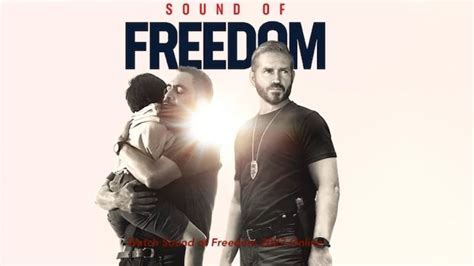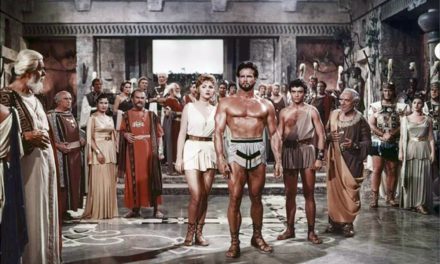Did I ever think about child trafficking or, more precisely, child kidnapping before I saw Sound of Freedom? Yes. As the father of two girls, I was aware of the horror stories of children wandering from a parent at a grocery store, never to be seen again. That said, I don’t believe my wife or I became obsessively protective of the kids. And that’s probably how things should be, at least here in the United States, right? Now that I have seen Alejandro Monteverde’s film, I still feel the same, but, then, my girls are adults; I wouldn’t blame a young parent who had seen it for keeping their children under lock and key for the next ten years. It’s that convincing.
The story (based on real events) begins in Tegucigalpa, Honduras, with a young girl, Rocio (Cristal Aparacio), in her bedroom singing contentedly to the rhythm of a drum she taps. The happy moment is interrupted by the arrival of Katy, a strikingly chic woman (Yessica Borroto Perryman) who, after an introduction, tells Rocio’s father Roberto (José Zúñiga) that she’s in charge of a talent-search for young children and that Rocio and her little brother Miguel (Lucás Ávila) are perfect candidates. The father complies and takes the exited kids to a hotel where Katy welcomes them into a hotel room to join others for a photo shoot.
The scene of the various children posing makes for an indelible memory, a wholly unpleasant one. The pictures of one child after another in freeze-frame show the cruel intent of the traffickers. Rocio’s series of shots is a prime case. The first pictures show the innocent girl we’ve already seen, but as they multiply, she begins to look older, more sensually attractive. One needn’t doubt that these pictures will be used to sell her online to interested parties. If Monteverdi had done nothing else to drive his point home, this scene still would have remained unforgettable.
When Roberto returns to collect Rocio and Miguel, he finds the room empty, and the truth is soon too plain that his and the other children have been kidnapped by traffickers. He can’t know, but they have been herded into a tractor trailer, then to a boxcar unit that will soon be loaded with dozens like it onto a ship heading to Cartagena, Colombia.
Is there any hope for their rescue? The movie shifts scene to the U.S. where Tim Ballard (Jim Caviezel), an agent with Homeland Security, busies himself catching traffickers and consumers of kidnapped children. And he’s been successful at it, but when a novice agent asks him how many children he’s returned to their parents, all he can say is that that’s not their job.
But the veiled rebuke hits home. Not long after, Ballard and his agents arrest a man who’s coming across the border with a young boy. This child turns out to be the kidnapped Miguel, and presently they reunite him with Roberto. But what about Rocio? Apparently, the trafficking ring has transported her to Colombia, which it goes without saying is outside the jurisdiction of Homeland Security.
Ballard feels that in good conscience he must do everything he can to find Rocio, but that means quitting his job and contacting authorities in Colombia. To make a long story short, that’s what he does, meeting with Jorge (Pablo Godino), Pablo (Eduardo Verástegui), and Vampiro (Bill Camp), a former cartel bigwig. Why does Ballard go to such lengths to save children he does not know? “Because,” he says, “God’s children are not for sale.” The others have no argument against that, and before long they set up a major sting operation, the offshoot of which is a trek into Colombian rebel territory in serach of Rocio.
Overall, Sound of Freedom is well-acted, passionate, and deeply involving. Given its subject, it’s also depressing. Even so, one might well imagine at the very least widespread approval of Monteverde’s film. But critical response has been mixed primarily because some detect a Trumpist or QAnon message flowing, not too subtly, beneath the surface. Some have gone so far as to suggest that Ballard’s actions, on screen and in real life, amount to vigilantism.
What gets lost in the controversy is the real focus of the movie, the plight of kidnapped children and the reality of a godless, immoral trade. Doubtless, complexities in dealing with human trafficking exist that no film can properly explore. But how is it that we’ve come to a point in our nation’s history that a plea to bring the exploitation of innocents to an end is treated with skepticism and contempt?














